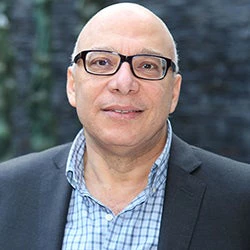 Young man working in an office.
Young man working in an office.
The COVID-19 pandemic has negatively affected health and education systems, the labor market, and social protection across the Gulf Cooperation Council countries. For example, 50% of regular health care visits were not provided and more than 12 million students were not attending schools and universities due to COVID-19–related closures. But despite these setbacks, the pandemic has presented an opportunity to accelerate some reforms that would have otherwise taken longer to be adopted, such as the use of technology in education, telemedicine, and an expansion of cash transfers to vulnerable individuals.
The COVID-19 pandemic underscores the urgency to boost their investment in human capital, which is vital for the economic development of countries worldwide, but especially for the GCC as it cannot, over the long term, continue to rely on revenues from oil and gas to fund countries’ development. As the pandemic has caused negative supply and demand shocks, for the GCC this was exacerbated by the oil price drop that has hit fiscal revenues hard and weakened external balances. Investing in human capital will help transform economies and promote growth, with broad implications for people’s welfare and prosperity.
Most GCC countries already have a strong focus on human development and have allocated significant shares of their budgets to human capital, but they need to do more to improve the effectiveness of these investments, especially now.
The Human Capital Project and Index
The GCC governments have shown strong political will for this transformation. Saudi Arabia, Bahrain, UAE, and Kuwait were among the first to adopt the World Bank’s Human Capital Project. This project is a global effort to improve investments in people through contributions to three areas—knowledge, skills, and health—which are quantified by the Human Capital Index. The Human Capital Index measures the contribution of health and education to the productivity of the next generation of workers. More specifically, it reflects the human capital a child born today can expect to accumulate by age 18, given the risks to health and education in the country where the child lives.
Although the GCC countries have recognized the importance of human capital, they could do more. The six countries rank higher on the Human Capital Index than the average of the Middle East and North Africa region as a whole, but lower than their peers in other regions with similar levels of per capita income. This relative ranking indicates that poor learning outcomes and health problems are slowing human capital formation and hampering moves toward sustainable and equitable growth.
The GCC countries face four main challenges in developing their human capital:
- Low levels of basic proficiency among schoolchildren: Despite substantial public investment in education, all six GCC member countries score lower than other high-income countries on international student assessments. Moreover, although school enrollment rates are high, when adjusted for the quality of education that children receive, the effective educational attainment in the GCC countries is far lower. There are also substantial gender gaps in learning between girls and boys, with boys consistently underperforming.
- A mismatch between education and the labor market: The skills taught in school do not adequately prepare students with skills needed for employment.
- A relatively high rate of adult mortality and morbidity due to noncommunicable diseases: In 2016, average life expectancy at birth in the GCC countries was about 76 years—relatively high compared with Organization for Economic Co-operation and Development countries. Yet mortality due to noncommunicable diseases is 71.5%, which is high.
- A unique labor market: Wages in the public sector are more generous than in the private sector (where most new jobs need to be created), and government employment to nationals is almost guaranteed.
In response, GCC countries should consider four main strategies to foster human capital:
- Investing in high-quality early childhood development to address low basic proficiency among children. Investing in the first six years of a child’s life is key as this is when the building blocks of the brain are formed, and the child’s environment stimulates brain development.
- Preparing youth for the future. Improving learning outcomes, responding to labor market needs, and reducing health risk factors are all important.
- Enabling greater labor force participation by the adult population. This can be achieved through life-long learning, improving conditions for female labor force participation, providing retraining or upskilling for unemployed or underemployed adults, and improving health to reduce adult mortality and morbidity.
- Creating an enabling environment for human capital formation. Such a productive environment will increase value for money in public spending on education and health, move toward a multisectoral approach to human capital, and foster social norms and political interests that will lead to greater productivity and prosperity.
Economic transformation is a long-term endeavor and improving human capital formation is key to sustainable growth. Once the pandemic has run its course and the GCC countries return to what may well be a “new normal,” accelerating investment in human capital will be critical for building a diversified and sustainable growth model.


Join the Conversation